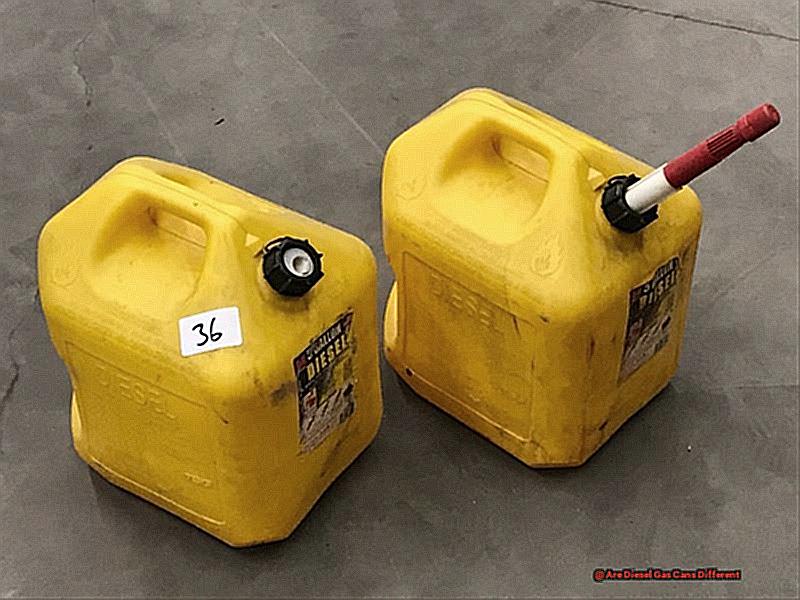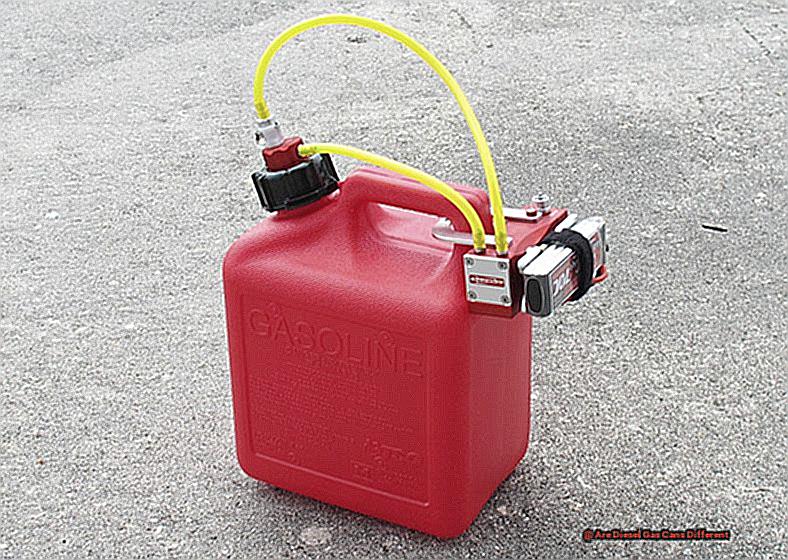
Are you someone who depends on diesel fuel for your vehicles or equipment?
Then you know the importance of finding the perfect gas can. With the world going green, diesel gas cans have become a hot topic.
But with so many options out there, it can be daunting to choose the right one. From size and safety features to materials and regulations, there are plenty of factors that differentiate diesel gas cans from each other.
So let’s gear up and take a closer look at the world of diesel gas cans.
Are Diesel Gas Cans Different?
Contents
- 1 Are Diesel Gas Cans Different?
- 2 Understanding the Differences Between Diesel and Regular Gas Cans
- 3 Material Composition of Diesel Gas Cans
- 4 Safety Features of Diesel Gas Cans
- 5 Choosing the Right Diesel Gas Can for Your Needs
- 6 Proper Use and Maintenance of Diesel Gas Cans
- 7 Common Mistakes When Using Diesel Gas Cans and How to Avoid Them
- 8 Conclusion
As someone who has worked with both types of fuel and their respective containers, I want to share some valuable insights into the key differences between these gas cans.
Construction Materials:
One of the most crucial differences between diesel gas cans and regular gas cans is the materials used in their construction. Diesel gas cans are typically made of heavy-duty plastic or metal, whereas regular gas cans are often made of lighter materials like plastic or thin metal. This difference is due to the unique properties of diesel fuel, which is thicker and more corrosive compared to regular gasoline. The heavier construction of diesel gas cans allows them to withstand the weight and corrosive nature of diesel fuel better.
Color Coding:
Another notable difference between these two types of gas cans is the color. Diesel gas cans are typically yellow, while regular gas cans are usually red. This color difference serves a vital purpose – to help users differentiate between the two types of fuel and avoid any mix-ups that could lead to engine damage. So, always pay attention to the color when selecting a gas can for your specific needs.
Capacity:
If you’ve ever compared diesel and gasoline vehicles, you may have noticed that diesel engines tend to have larger fuel tanks. The same principle applies to diesel gas cans and regular gas cans. Diesel engines require more fuel, so it makes sense for diesel gas cans to have a larger capacity than regular gas cans.
Spout Design:
Another difference that may not be immediately noticeable is the design of the spouts on these two types of gas cans. Diesel spouts are typically wider and have a larger opening compared to regular gas can spouts. This design allows for easier pouring and accommodation for the thicker consistency of diesel fuel.
Safety Features:
Due to its highly flammable nature, diesel fuel requires extra safety measures when being stored and transported. Therefore, diesel gas cans may have additional safety features like locking mechanisms or child-proof caps to prevent any accidents. Regular gas cans may not have these features, as gasoline is less volatile.
Understanding the Differences Between Diesel and Regular Gas Cans
When it comes to storing and transporting fuel, it’s important to have the right type of gas can. While most people are familiar with regular gas cans, there is also a specific type of gas can designed for diesel fuel. As someone who has worked with both types of gas cans, I am here to provide valuable insights into the key differences between diesel and regular gas cans.
Material and Design
The main difference between diesel and regular gas cans lies in the materials and design. Diesel fuel is a heavier and more viscous liquid compared to regular gasoline, which is lighter and more volatile. Due to these differences, diesel gas cans are built differently from regular gas cans.
Diesel gas cans are typically made of thicker and more durable materials such as metal or heavy-duty plastic. This is because diesel fuel is more corrosive and can cause damage to traditional plastic gas cans. On the other hand, regular gas cans are usually made of lighter materials like plastic or thin metal, as regular gasoline is less corrosive and doesn’t require as much protection.
In terms of design, diesel gas cans often have a wider and sturdier base to support the weight of the fuel. Regular gas cans may have a narrower base for easier handling. Additionally, diesel gas cans may have special features like built-in vents to release pressure, as diesel fuel can expand and contract with temperature changes. Regular gas cans may not have these vents, as regular gasoline is less prone to expansion and contraction.
Safety Features

Another important factor to consider when comparing diesel and regular gas cans is safety. Diesel fuel is flammable and can release toxic fumes when exposed to air. Therefore, diesel gas cans may have added safety features such as spill-proof nozzles or child-resistant caps to prevent accidents.
These safety features may not be necessary for regular gas cans due to the lower risk of fumes and spills from regular gasoline. However, it’s always important to handle any type of fuel with caution and follow proper safety protocols.
Material Composition of Diesel Gas Cans
As someone who has worked with both diesel and regular gas cans, I can attest to the significant differences between the two when it comes to material composition. While both types of cans serve the same purpose of storing and transporting fuel, the type of fuel they hold requires different materials to ensure safety and durability.
One of the most important factors to consider when purchasing a diesel gas can is the material it is made of. Diesel fuel is thicker and more corrosive compared to regular gasoline, meaning it can degrade traditional plastic or metal canisters over time. That’s why diesel gas cans are typically made of more heavy-duty materials such as high-density polyethylene (HDPE), steel, or aluminum.
HDPE is a type of plastic that is highly resistant to chemicals and can withstand extreme temperatures. This makes it an ideal material for storing diesel fuel, which can be harsh on traditional plastics. Steel and aluminum are also commonly used for diesel gas cans due to their sturdiness and resistance to corrosion from diesel fuel.
In addition to material composition, diesel gas cans may also have additional features such as reinforced handles or thicker walls. These features make them heavier and bulkier compared to regular gas cans, but they are necessary to ensure the safety and longevity of the container.
It’s important to note that not all diesel gas cans are made with the same materials. Cheaper options may use lower quality plastics or thinner metals, which can compromise the integrity of the can and potentially lead to leaks or spills. This is why it’s crucial to check the material composition when purchasing a diesel gas can.
When choosing a diesel gas can, it’s also essential to consider its size and shape. Diesel fuel expands when heated, so it’s crucial to choose a can with enough room for the fuel to expand without causing any spills or leaks. Larger diesel gas cans may also come with additional features such as pour spouts or vent caps, making it easier and safer to dispense the fuel into a vehicle or equipment.
Safety Features of Diesel Gas Cans
Gasoline and diesel may both be liquid fuels, but they have different properties that require specific safety measures. When it comes to transporting and storing diesel fuel, the right gas can is crucial. In this blog post, I will guide you through the essential safety features of diesel gas cans to help you make an informed decision.
Material Matters:

The first and most important feature of a diesel gas can is its material. Unlike regular gas cans, which are commonly made of plastic, diesel gas cans are primarily made of metal. Why? Because diesel fuel is more corrosive than gasoline and can cause plastic containers to deteriorate over time, increasing the risk of leaks and spills. So, when choosing a diesel gas can, opt for heavy-duty HDPE plastic, sturdy steel, or reliable aluminum.
Design for Durability:
Aside from the material, the design of a diesel gas can is also critical for safety. Diesel gas cans have a wider base compared to regular gas cans, providing more stability and reducing the risk of tipping over. They also have a thicker and more durable handle for easier carrying. Additionally, most diesel gas cans have a spring-loaded pressure relief valve on the cap to prevent pressure build-up inside the can, reducing the risk of explosion.
Flame Arrestors and More:
Another essential safety feature of diesel gas cans is the presence of a flame arrestor. This small mesh or plate covers the spout opening and prevents flames or sparks from entering the can and causing an explosion. Some cans also have a locking mechanism on the spout to prevent accidental spills and leaks.
Labeling for Clarity:
When it comes to labeling, diesel gas cans are required by law to have specific markings indicating that they contain flammable liquid and are only intended for use with diesel fuel. This is important for both safety reasons and to avoid confusion with other types of fuel.
Childproofing for Peace of Mind:
For those with children, some newer models of diesel gas cans come with childproof caps. These caps make it difficult for children to open the can and access the fuel, providing an extra layer of safety.
Remember These Guidelines:
While diesel gas cans are designed with safety in mind, it is essential for users to always follow safety guidelines when handling them. This includes keeping them away from heat sources, using them in well-ventilated areas, and never smoking while refilling or handling the can.
Choosing the Right Diesel Gas Can for Your Needs
When it comes to handling diesel fuel, safety should always be a top priority. And one of the key factors in ensuring the safe transportation and storage of this corrosive substance is choosing the right diesel gas can. With so many options available in the market, it can be overwhelming to find the perfect fit for your needs. But don’t worry, as an expert on the topic, I’m here to guide you through the essential factors to consider when selecting a diesel gas can.
Material Matters
The first thing to consider is the material of the gas can. Most diesel gas cans are made of either metal or plastic, each with its own pros and cons. Metal cans are known for their durability and ability to withstand high temperatures, making them suitable for heavy-duty use. However, they can also be heavy and prone to rusting over time. On the other hand, plastic cans are lightweight and resistant to rust, but they may not be as durable in extreme conditions. So, think about your specific needs and choose accordingly.
Size Up Your Needs
The size of the diesel gas can is another crucial factor to consider. These cans come in various sizes, from 1 gallon to 5 gallons or more. If you will be using the fuel for heavy-duty equipment or vehicles, a larger can may be necessary. However, if you only need to carry small amounts of fuel for emergencies or small equipment, a smaller can will suffice. Keep in mind that larger cans can be heavier and bulkier, so consider your means of transportation as well.
Spout Type for Convenience
Next up is the type of spout on the diesel gas can. Some cans have a simple spout that pours out the fuel in a steady stream, while others have a more complex spout with a vent and a trigger mechanism. The latter can be more convenient for pouring fuel into smaller openings or for controlling the flow of fuel. Consider your specific needs and choose a spout type that will make your fueling process easier and safer.
Safety Standards Approved
When it comes to handling diesel fuel, safety regulations are a must. Make sure to check if the diesel gas can is approved by safety standards such as the Department of Transportation (DOT) or the Environmental Protection Agency (EPA). These regulations ensure that the can is safe for transportation and storage of diesel fuel, giving you peace of mind.
Proper Use and Maintenance of Diesel Gas Cans
As diesel fuel continues to be a popular choice for vehicles and equipment, it’s important to understand the proper use and maintenance of diesel gas cans. These containers are not only crucial for safely transporting this corrosive substance but also for storing it in a safe and efficient manner. As an expert on the topic, I will provide you with clear and concise instructions to ensure the safe handling and transportation of diesel fuel.
Different Types of Diesel Gas Cans
There are several types of diesel gas cans available in the market, each with its own unique design and features. Some common types include traditional metal jerry cans, plastic jugs, and portable fuel tanks. While metal jerry cans are known for their durability, plastic jugs are more lightweight and easier to handle. Portable fuel tanks, on the other hand, offer a higher capacity for larger vehicles and equipment. It’s important to understand the differences between these types before deciding which one is right for your specific needs.
Proper Use of Diesel Gas Cans
Before using a diesel gas can, it’s crucial to follow the manufacturer’s instructions to ensure safe and effective use. Start by making sure that the can is clean and free from any residue or debris. This will prevent any contamination when filling it with diesel fuel. Always use a funnel or spout to avoid spills and overfilling. And remember, never mix diesel with other fuels or chemicals in the same can as this can cause dangerous reactions.
Maintenance of Diesel Gas Cans
Regular maintenance of diesel gas cans is essential to ensure their longevity and safe use. Before each use, check for any cracks, leaks, or rust on metal cans. Plastic jugs should be inspected for any signs of wear and tear such as cracks or discoloration. If any defects are found, replace the can immediately to avoid potential hazards. It’s also important to clean the can after each use to prevent buildup and contamination.
Storing Diesel Gas Cans
Proper storage of diesel gas cans is crucial for safety reasons. The cans should be stored in a well-ventilated area away from any heat sources or open flames. Avoid storing them near any electrical equipment or in direct sunlight. If possible, store the cans in a designated area specifically for flammable liquids. And always keep them out of reach of children and pets.
Common Mistakes When Using Diesel Gas Cans and How to Avoid Them
Diesel gas cans are a must-have for anyone who relies on diesel fuel to power their vehicles or equipment. However, despite their widespread use, many people make mistakes when handling these cans, which can lead to costly consequences. As an expert in the topic of diesel gas cans, I’m here to share with you some common mistakes and how to avoid them for safe and efficient usage.
Mistake #1: Using the Same Gas Can for Gasoline and Diesel Fuel
One of the biggest mistakes people make is using the same gas can for both gasoline and diesel fuel. This is a recipe for disaster as it can lead to cross-contamination and damage to both the engine and the fuel system. It is crucial to have separate gas cans for each type of fuel to avoid any potential hazards.
Mistake #2: Improper Labeling of Gas Cans
Another common mistake is not properly labeling diesel gas cans. This may seem like a small detail, but it can lead to confusion and potential accidents if someone accidentally uses diesel fuel in a gasoline-powered engine. To avoid this mistake, make sure all gas cans are clearly labeled with the type of fuel they contain.
Mistake #3: Using Plastic Gas Cans for Diesel Fuel
Plastic gas cans may be convenient and lightweight, but they are not suitable for storing diesel fuel. This is because diesel fuel can cause static electricity buildup in plastic containers, which can lead to fires or explosions. It is best to use metal gas cans specifically designed for diesel fuel, as they are less prone to static electricity buildup.
Mistake #4: Not Properly Sealing Gas Cans
Proper sealing of gas cans is crucial for safe and efficient usage. Not only does it prevent spills, but it also helps preserve the quality of the fuel. Make sure to securely tighten the cap or lid of the gas can before transporting or storing it.
Mistake #5: Overfilling Gas Cans
It may be tempting to fill up the gas can to its maximum capacity, but this can lead to spills and potential hazards. It is important to follow the manufacturer’s instructions on how much fuel to fill in the gas can. Overfilling can also cause pressure buildup, which can lead to leaks and spills.
Conclusion
In conclusion, selecting the proper diesel gas can is a critical aspect of handling and storing this vital fuel. In today’s world, where sustainability is at the forefront, it’s essential to be aware of the distinctions between diesel gas cans and their regular counterparts. From material composition and color-coding to capacity and safety features, there are several factors that differentiate these two types of gas cans.
To ensure safe usage and maintenance of diesel gas cans, it’s crucial to adhere to specific guidelines. This includes carefully selecting a suitable can for your specific needs, clearly labeling them, and storing them in a secure location away from potential sources of heat. Additionally, avoiding common errors like using the same can for different fuels or overfilling it is imperative.
Having experience with both diesel and regular gas cans, I hope this comprehensive guide has provided valuable insights into understanding the significance of finding the right diesel gas can. By following these guidelines and avoiding common mistakes, you can guarantee efficient and safe usage of your diesel fuel while also contributing towards a more sustainable future.


